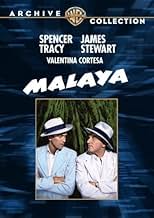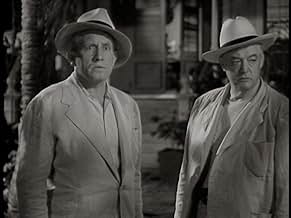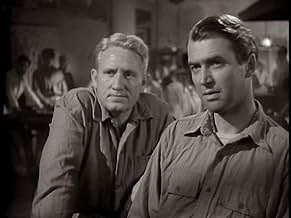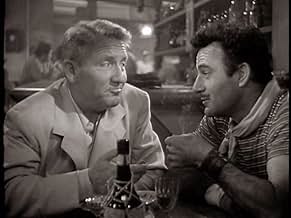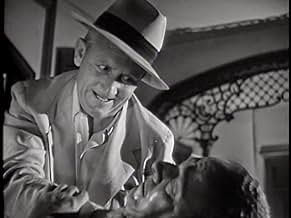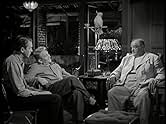IMDb-BEWERTUNG
6,5/10
1580
IHRE BEWERTUNG
Füge eine Handlung in deiner Sprache hinzuNewspaperman Royer convinces government officials of a plan to obtain rubber by smuggling it out from under the Japanese. Carnahan is let out of prison to help.Newspaperman Royer convinces government officials of a plan to obtain rubber by smuggling it out from under the Japanese. Carnahan is let out of prison to help.Newspaperman Royer convinces government officials of a plan to obtain rubber by smuggling it out from under the Japanese. Carnahan is let out of prison to help.
- Regie
- Drehbuch
- Hauptbesetzung
- Auszeichnungen
- 2 wins total
Valentina Cortese
- Luana
- (as Valentina Cortesa)
Lester Matthews
- Matisson
- (Gelöschte Szenen)
Joel Allen
- Federal Agent
- (Nicht genannt)
Besmark Auelua
- Henchman
- (Nicht genannt)
George M. Carleton
- Small Businessman
- (Nicht genannt)
Silan Chan
- Malay Girl
- (Nicht genannt)
Spencer Chan
- Chinese Shipmaster
- (Nicht genannt)
Joseph Crehan
- Businessman with Pipe
- (Nicht genannt)
Empfohlene Bewertungen
Even with a better cast, this would not have been much of a film. On the surface it looks like it will be some sort of action film, with spies going into enemy territory to steal, or rather negotiate on the black market for, essential supplies. But there's little intrigue and very little action. Most of the scenes are simply characters sitting in chairs talking to one another. The surprise at the very end of the film is so far-fetched as to undercut the credibility of nearly everything else. The love story involves two people who have no reason to be attracted to one another. There are elements of Casablanca here, set in a country occupied by the enemy, a nightclub owner consorting with an enemy officer, the gambling being fixed by the owner to pay someone he wants to do a favour to, and a cynic acquiring higher ideals; but it's all a very pale imitation of Casablanca. Some comments suggest that there is something "noirish" about the film. Well. it's in black and white, but it does not have the requisite sense of evil and foreboding.
But the biggest failure is in the casting. James Stewart is supposed to play a sour, hard-bitten, cynical operator who finds a little patriotism late in life. But Stewart can't help coming across as a nice guy. He may speak the tough words, but the tone is wrong. His eyes shift in that self-deprecating way of his, he carries himself in that modest way of his, and he just doesn't come off as the character he is supposed to be playing. When his partner is punching someone over and over in the face, Stewart looks repelled by the brutality. Spencer Tracy is probably even worse in his role as a tough jailbird who is let out of Alcatraz to help in the mission. He looks old; his figure is dumpy, his way of moving is slow. He threatens a man, but he doesn't seem very scary. (DeNiro would know how to do that.) He is the romantic interest of a nightclub singer who is crazy over him, yet he's way too old for her and doesn't have anything of the sort of animal magnetism that might make him believable as her lover. In fact, to be honest, there were moments when Tracy looked like he couldn't act. The Japanese have been beating him, trying to get him to talk; Tracy frowns a little but registers no pain, no discomfort, no fear; he shakes it off and then looks comfortable. When he dumps his girlfriend to keep her safe, his face shows nothing.
I forced myself to watch to the end because I have an interest in Malaya. On its own terms, this movie would have lost me long before the mid-way point.
But the biggest failure is in the casting. James Stewart is supposed to play a sour, hard-bitten, cynical operator who finds a little patriotism late in life. But Stewart can't help coming across as a nice guy. He may speak the tough words, but the tone is wrong. His eyes shift in that self-deprecating way of his, he carries himself in that modest way of his, and he just doesn't come off as the character he is supposed to be playing. When his partner is punching someone over and over in the face, Stewart looks repelled by the brutality. Spencer Tracy is probably even worse in his role as a tough jailbird who is let out of Alcatraz to help in the mission. He looks old; his figure is dumpy, his way of moving is slow. He threatens a man, but he doesn't seem very scary. (DeNiro would know how to do that.) He is the romantic interest of a nightclub singer who is crazy over him, yet he's way too old for her and doesn't have anything of the sort of animal magnetism that might make him believable as her lover. In fact, to be honest, there were moments when Tracy looked like he couldn't act. The Japanese have been beating him, trying to get him to talk; Tracy frowns a little but registers no pain, no discomfort, no fear; he shakes it off and then looks comfortable. When he dumps his girlfriend to keep her safe, his face shows nothing.
I forced myself to watch to the end because I have an interest in Malaya. On its own terms, this movie would have lost me long before the mid-way point.
If this movie did not have Jimmy Stewart and Spencer Tracy, the film wouldn't have even merited a score of five. It was a very uninspiring and forgettable wartime film made several years after the war actually ended. It just seemed like all the energy was missing from the film. In fact, about the only energy came from Sidney Greenstreet's pet bird--now that bird can act! Another problem with the film is the idea of casting Spencer Tracy in the role of a selfish, devil-may-care smuggler in Alcatraz at the beginning of the film. The believability of the performance didn't improve once he made it to Malaya. This is actually the sort of role I might have expected for Clark Gable or maybe even Errol Flynn (yes, I know he was with a different studio), but for Tracy, an actor who often was cast as the priest or nice guy, it just wasn't terribly convincing. Plus, he just acted too nice to be as seedy as they described him as being.
In the end, the only interesting thing about this film is how so much money was spent on the cast and so little bang was achieved for MGM's buck. This is purely a time-passer or film for those devotees of Stewart or Tracy.
In the end, the only interesting thing about this film is how so much money was spent on the cast and so little bang was achieved for MGM's buck. This is purely a time-passer or film for those devotees of Stewart or Tracy.
There is a scene that makes the whole picture worthwhile (although it is otherwise pretty ordinary):
Sydney GREENSTREET is entering a room after app. 2/3 of the movie, where Spencery Tracey has just been "treated kindly" in an "interview", Greenstreet is sweating (as always), sitting down and looking at the molestor of Tracy, then says (roughly): "If you say this was necessary, then of course it was necessary, but wasn't that much for a bottle of poor booze?". The officer say: "But he broke our rules". Greenstreet: "A man who drinks and then doesn't break any rules is no man. Drinking and making troubles goes together, this is also a rule." What a line !! Officer: "I love your logic." Of course these are not exactly the lines from the picture, cause I saw the German dubbed version and re-translated them, but they can only be better in the English version.
Hilarious! Tape it, when shown on TV next time and get to that scene, it is just great!
Sydney GREENSTREET is entering a room after app. 2/3 of the movie, where Spencery Tracey has just been "treated kindly" in an "interview", Greenstreet is sweating (as always), sitting down and looking at the molestor of Tracy, then says (roughly): "If you say this was necessary, then of course it was necessary, but wasn't that much for a bottle of poor booze?". The officer say: "But he broke our rules". Greenstreet: "A man who drinks and then doesn't break any rules is no man. Drinking and making troubles goes together, this is also a rule." What a line !! Officer: "I love your logic." Of course these are not exactly the lines from the picture, cause I saw the German dubbed version and re-translated them, but they can only be better in the English version.
Hilarious! Tape it, when shown on TV next time and get to that scene, it is just great!
Malaya may seem a fantastic tale, but the story actually has quite a bit of truth to it. When World War II broke out the Japanese quickly conquered most of the rubber producing areas of the world. The modern mechanized army does run on rubber and both the USA and Germany developed types of synthetic rubber to be used.
My mother told me during World War II there were all kinds of drives for recyclable material and among the most valuable was rubber. People contributed all kinds of old tires for the war effort.
Lionel Barrymore plays the real life Manchester Boddy who was publisher of the Los Angeles Daily News who was the prime mover in the scheme you see portrayed here in Malaya. Though this story is fictional, the need for rubber in the USA was critical at the time and there was in fact a rubber smuggling operation going on.
Spencer Tracy before he came to MGM played just the kind of two fisted action heroes at Fox which was his original studio. He expressed an interest in doing this kind of film for old time sake and got cast in it. He really isn't poaching on Humphrey Bogart's territory these were the kind of roles he originally did in film while Bogey was playing hoods over at Warner Brothers.
Because the script called for a buddy team of heroes, James Stewart was approached and he even conceded top billing to Tracy. According to the Films of James Stewart, he admired Tracy as an actor so much that he was grateful just for the opportunity to work with him again. In fact Stewart's first film role was in Murder Man, a film that starred Spencer Tracy back in 1935.
With the two of these big stars in the leads, MGM was able to recruit a really outstanding group of players like John Hodiak, Valentina Cortese, Roland Winters, Richard Loo, the aforementioned Lionel Barrymore and my two favorites Gilbert Roland and Sydney Greenstreet.
Roland was shortchanged though. Watching Malaya I could tell his role as Tracy's adventurous friend was left on the cutting room floor. But even a little Gilbert Roland is always a pleasure to watch.
This was Sydney Greenstreet's last film and in it he essentially reprises the part of Ferrari in Casablanca. He's got the best lines in the film and his scenes with his cockatoo are classic. As he says, he's just a saloon keeper with an access to gossip. Which gets put to very good use.
Stewart the idealist, Tracy the cynical realist. Too bad they didn't work together more.
My mother told me during World War II there were all kinds of drives for recyclable material and among the most valuable was rubber. People contributed all kinds of old tires for the war effort.
Lionel Barrymore plays the real life Manchester Boddy who was publisher of the Los Angeles Daily News who was the prime mover in the scheme you see portrayed here in Malaya. Though this story is fictional, the need for rubber in the USA was critical at the time and there was in fact a rubber smuggling operation going on.
Spencer Tracy before he came to MGM played just the kind of two fisted action heroes at Fox which was his original studio. He expressed an interest in doing this kind of film for old time sake and got cast in it. He really isn't poaching on Humphrey Bogart's territory these were the kind of roles he originally did in film while Bogey was playing hoods over at Warner Brothers.
Because the script called for a buddy team of heroes, James Stewart was approached and he even conceded top billing to Tracy. According to the Films of James Stewart, he admired Tracy as an actor so much that he was grateful just for the opportunity to work with him again. In fact Stewart's first film role was in Murder Man, a film that starred Spencer Tracy back in 1935.
With the two of these big stars in the leads, MGM was able to recruit a really outstanding group of players like John Hodiak, Valentina Cortese, Roland Winters, Richard Loo, the aforementioned Lionel Barrymore and my two favorites Gilbert Roland and Sydney Greenstreet.
Roland was shortchanged though. Watching Malaya I could tell his role as Tracy's adventurous friend was left on the cutting room floor. But even a little Gilbert Roland is always a pleasure to watch.
This was Sydney Greenstreet's last film and in it he essentially reprises the part of Ferrari in Casablanca. He's got the best lines in the film and his scenes with his cockatoo are classic. As he says, he's just a saloon keeper with an access to gossip. Which gets put to very good use.
Stewart the idealist, Tracy the cynical realist. Too bad they didn't work together more.
(Version reviewed is the 90-minute German-language showing on ARD on July 5, 2001.)
There are two rather unbecoming aspects about this movie, one being its blunt nationalism, the other one its odd casting. Where you would have expected, say, William Holden as the daring journalist and, well, Humphrey Bogart as the cynical hotshot, you get Jimmy and Spence. It's not that they don't act well, but the rôles just don't seem to fit. What a difference with handsome Mexican Gilbert Roland who is chosen perfectly (as Romano).
Journalist Royer (Stewart) gets his rival/friend Carnaghan (Tracy) out of prison with help from official sides (fine thesping by John Hodiak) for the good of the nation, that is, to haul all possible rubber out of British, but Jap-occupied, Malaya for the United States. Of course, the European land-owners give all assistance possible to support the sacred case, including a voluntary beating that Ian MacDonald gets from Tracy. America's raw nationalism was curiously carried right into the German translation: dubious Bruno Gruber (played by "Charlie Chan" Roland Winters) is named Marty Robber (or so) in German dubbing version of 1955, because a badman just couldn't have a German name to German audiences... This should be worth a correction, although the forgery effect is not as high as in the original 1952 dubbing of "Casablanca", that was corrected in a new version as late as in 1968. (Stewart, by the way, is synchronized well by Eckart Dux this time, not by regular Siegmar Schneider.)
Although film's humour is well-measured, it cannot conceal, but rather contributes to, the dare-devil chauvinism, four years after the war ended. Tracy played something of a contrary rôle in "Bad Day at Black Rock", as regards the U.S. relationship to the Japanese.
There's a lot of epigonism of "Casablanca", though not as much as in its immediate successors, in "Malaya". We have Richard Loo's Col. Tomura marching into the bar like Maj. Strasser; Italy's Cortese in the European female part (the story might have done without her, were there not some nice dialogues with Tracy); and the wonderful Sydney Greenstreet, who somewhat resumes his Senor Ferrari rôle (that parrot of his is a blue one, I suppose).
Despite this emulation, Frank Fenton's screenplay has something interesting about it that makes this movie agreeable after all. But it wouldn't have taken the famous leading players, close to miscasts, for something that appears like an MGM "B" production to me. - Worst thing is, I couldn't spot DeForest "Bones" Kelley anywhere around, although he is said to be there.
There are two rather unbecoming aspects about this movie, one being its blunt nationalism, the other one its odd casting. Where you would have expected, say, William Holden as the daring journalist and, well, Humphrey Bogart as the cynical hotshot, you get Jimmy and Spence. It's not that they don't act well, but the rôles just don't seem to fit. What a difference with handsome Mexican Gilbert Roland who is chosen perfectly (as Romano).
Journalist Royer (Stewart) gets his rival/friend Carnaghan (Tracy) out of prison with help from official sides (fine thesping by John Hodiak) for the good of the nation, that is, to haul all possible rubber out of British, but Jap-occupied, Malaya for the United States. Of course, the European land-owners give all assistance possible to support the sacred case, including a voluntary beating that Ian MacDonald gets from Tracy. America's raw nationalism was curiously carried right into the German translation: dubious Bruno Gruber (played by "Charlie Chan" Roland Winters) is named Marty Robber (or so) in German dubbing version of 1955, because a badman just couldn't have a German name to German audiences... This should be worth a correction, although the forgery effect is not as high as in the original 1952 dubbing of "Casablanca", that was corrected in a new version as late as in 1968. (Stewart, by the way, is synchronized well by Eckart Dux this time, not by regular Siegmar Schneider.)
Although film's humour is well-measured, it cannot conceal, but rather contributes to, the dare-devil chauvinism, four years after the war ended. Tracy played something of a contrary rôle in "Bad Day at Black Rock", as regards the U.S. relationship to the Japanese.
There's a lot of epigonism of "Casablanca", though not as much as in its immediate successors, in "Malaya". We have Richard Loo's Col. Tomura marching into the bar like Maj. Strasser; Italy's Cortese in the European female part (the story might have done without her, were there not some nice dialogues with Tracy); and the wonderful Sydney Greenstreet, who somewhat resumes his Senor Ferrari rôle (that parrot of his is a blue one, I suppose).
Despite this emulation, Frank Fenton's screenplay has something interesting about it that makes this movie agreeable after all. But it wouldn't have taken the famous leading players, close to miscasts, for something that appears like an MGM "B" production to me. - Worst thing is, I couldn't spot DeForest "Bones" Kelley anywhere around, although he is said to be there.
Wusstest du schon
- WissenswertesSydney Greenstreet's final film.
- PatzerOne scene features wild chimpanzees. Chimps are natives of Africa, not Malaya.
- Zitate
John Royer: You have to remember, this guy's a German.
Carnaghan: Yeah, but he's a greedy man, and greed has a nationality all its own.
- VerbindungenEdited from Schnellboote vor Bataan (1945)
- SoundtracksBlue Moon
(uncredited)
Written by Richard Rodgers and Lorenz Hart
Performed by Valentina Cortese (as 'Luana'), also whistled by James Stewart
Top-Auswahl
Melde dich zum Bewerten an und greife auf die Watchlist für personalisierte Empfehlungen zu.
- How long is Malaya?Powered by Alexa
Details
- Erscheinungsdatum
- Herkunftsland
- Sprache
- Auch bekannt als
- Operation Malaya
- Drehorte
- Produktionsfirma
- Weitere beteiligte Unternehmen bei IMDbPro anzeigen
Box Office
- Budget
- 2.396.000 $ (geschätzt)
- Laufzeit1 Stunde 38 Minuten
- Farbe
- Seitenverhältnis
- 1.37 : 1
Zu dieser Seite beitragen
Bearbeitung vorschlagen oder fehlenden Inhalt hinzufügen

